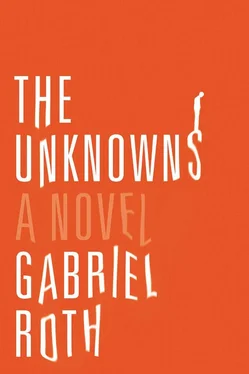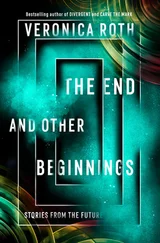We make plans to go out tonight to eat and drink, and I put her on a bus and head back to the convention center. I’m not due at “Surviving the Crash” for an hour and a half, so I ride the escalator and find a bench on the unoccupied third floor. The walls are tinted glass, and the metal grid between the panes casts rhomboid shadows. There is something soothing and luxurious about all this expensive real estate sitting empty. As the hum of professional activity wafts up from the floors below, I feel saturated with contentment. I know everything I need to know right now. A janitor pushes a vacuum along the floor and I follow his path in the slant of the sunlit carpet fibers.
The second panel goes just as well as the first, or perhaps better. I make one remark that gets a full-on laugh from the audience, which makes me think I should have been a comedian —This is the best feeling in the world; you’re bringing joy to people, plus they worship you like a god . I wish Maya had been here to see it. If she could see only one of the two panels, which would be preferable: the earlier one, in which I vanquished an opponent in verbal combat, or this one, in which I made a successful joke? This thought exercise is interrupted by a question from the moderator about raising venture capital.
My line on “Surviving the Crash” is Just build the best thing you can and if it’s good enough someone will pay you money for it . That’s true as far as it goes, but it leaves out the one million accidents that are necessary ingredients in any success story. For instance, this incredible girl who seems to like me. We might never have met, or she could have had a boyfriend or been a lesbian. But let’s not discount the role played by my own perspicacity and adroitness. I used my native wit to track her down and my carefully honed charm to beguile her. I triumphed over every obstacle, and if most of those obstacles were self-generated, that only underscores the difficulty of the triumph. And this last hurdle, this level boss, this mental loop that I was almost trapped in… No, I was trapped in it, and I jolted myself out and made it home. And now I just have to answer a few more questions from these aspiring entrepreneurs, all of whom want to be where I am, young and rich and basking in new love, and then I can go buy some new clothes and take Maya somewhere expensive, with fancy cocktails in specialized glasses. The panel ends, and there’s clapping, and I hustle out quickly, avoiding eye contact with the scrum of would-be founders.
It’s already dark when my cab pulls up outside Maya’s building. The streetlights are high and weak and the block has a ghostly feel. I tell the driver to wait, let myself in, and call up the stairs to warn her of my arrival. She steps out of her room applying a final coat of lip gloss, and when it’s done she looks at me with a smile that’s somehow both calculated and innocent — it recognizes and enjoys its own devastating effect.
Her final steps down the hall toward me might almost be choreographed: as she moves she slides on a heavy coat, grabs her purse from a hook, slips the lip gloss into it. I’m on the second stair from the top — our spot — and when she reaches me she leans in and kisses me just enough to let me know she means it without messing up her lips.
In the cab we talk about what we’re doing, the occasion.
“So this is Fancy Eric,” she says, giving me the once-over. “I like it.”
“These shoes are made from opossums,” I say.
“Sustainably harvested opossums, I’m assuming.”
“You could harvest these opossums for a thousand years, you’d end up with more opossums than you had at the beginning.”
“Mine are vegetarian,” she says. “They’re made from kale.”
My hand is on her thigh. “A special kind of high-tech kale.”
“A kind of kale that’s tanned and dyed to look like black leather.”
“How does it taste?”
“You have no idea .”
In front of the restaurant I climb out and extend a hand for Maya. Presumably somewhere there are people who can perform the man-helps-woman-out-of-cab bit with no ironic flourishes on either side, but we have never met those people.
We are half an hour early because we want to wait in the bar, where we sit in a booth whose back rises above our heads and makes us feel cocooned in velveteen. A gentleman in his forties, who knows as much about liquor as I do about Unix, hands us lists of specialty cocktails that cost sixteen dollars and contain at least five ingredients. Maya chooses something involving gin and muddled blueberries; I order the second-oldest whiskey, which is a more masculine approach to spending a lot of money on alcohol.
“So!” she says after we clink glasses. “You were such a rock star today! I had no idea you were good at stuff like that.”
“I’m not, really,” I say. “You know how sometimes when you’re feeling good you can do things you wouldn’t normally be able to do.” I am trying to say that she gives me special powers without quite saying it, although by the end of this whiskey I’ll probably just be saying it.
“With me it’s totally an either/or thing,” she says. “When I go on the radio, I can tell from the first minute how it’s going to go. Like with that school budget story — I knew it was going to be hard to sum up, and then I started talking and two minutes later I’m still trying to explain it. Two minutes is forever .”
“It wasn’t that bad,” I say. I don’t think I told her I was listening.
“The thing is — and thanks, you’re sweet — but the thing is, even if it was fine, it threw me off for the rest of the show. I couldn’t give simple answers to any of the questions. And then when we started getting calls — did you hear the whole thing? There was this one terrible guy, this racist guy…”
“I don’t think I heard that far,” I say. Of course I heard the whole thing.
“So this guy calls in, and he was like, The problem is they’re spending all this money on trying to equalize the test scores, because the blacks always score lower than the whites, and we’re going to spend all this money trying to make sure all the groups score the same . And usually I know how to handle these guys, but—”
“I totally heard this,” I say, because why the hell not? “You got a bit more heated, there was a little more fire in your voice, but you were still totally articulate and convincing. You said, You invest in the underserved areas because that’s where the need is greatest, but it’s also where the returns are highest . And the way you said it, it was like, Good morning, sir — I’m going to be totally courteous and professional while I carve you into pieces .”
She’s a bit taken aback — she wasn’t expecting a direct quotation from a radio appearance she made more than three weeks ago — but I think in a positive way. “Well, thanks,” she says. “That’s kind of what happened to you with that privacy guy.”
“I guess so,” I say. “I mean, he’s not actually harmful like a racist, he’s just irritating.”
“Yeah, but you got some mileage from that irritation,” she says. “And you were the underdog. If some racist nutjob wants to pick a fight with me, literally everybody listening to public radio in the Bay Area is on my side. You were there representing big scary corporations.”
“I know — it’s weird,” I say. “I started this thing that was basically a supermarket loyalty-card program, and now somehow I’m the guy inside your computer watching you undress.”
“Well, you did great,” she says.
“Thanks. How’s the drink?”
“It’s the best thing I’ve ever tasted in my life. How’s yours?”
Читать дальше












